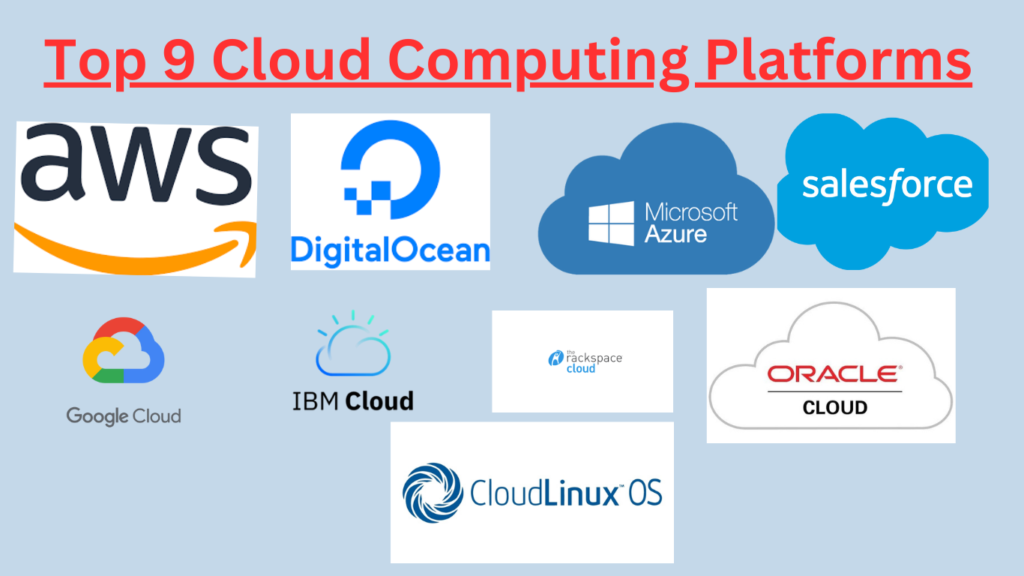A cloud computing platforms is an operating system and server hardware in a data center that are configured to provide cloud computing platforms services to customers. Instead of purchasing, installing, and managing the data centers, servers, and software required to make computing resources available on-demand over the Internet, cloud platforms allow businesses to make their computing resources available on-demand over the Internet in a payment form. Allow. You will be able to rent access on demand via the Internet. In the courtyard.
Cloud technology is now a major driver of the shift from traditional IT services to next-generation computing solutions that redefine how businesses deliver software and applications and how customers use them.
The rapid adoption of the Internet of Things (IoT), 5G technology, and edge computing, along with the increasing consumption of big data and the growing use of real-time data analytics powered by AI, are the major contributors to this adoption. Contribute to the development of cloud computing worldwide.
A cost-effective alternative to on-premises IT and the foundation of app-based, data-driven technology environments, cloud computing platforms provides easy access to a variety of resources, including databases, servers, and storage, anytime, anywhere. give. And a virtual machine.
Forward-looking companies are moving services, applications, and software to the cloud to take advantage of the rapidly growing cloud infrastructure and become more adaptable, agile, and responsive. As a result, billions of dollars of investment have recently flowed into the cloud ecosystem.
Gartner, Inc., the world’s leading research and consulting firm. According to this, the global public cloud market is expected to be a $300 billion economy by 2024. Statista, the Internet’s leading statistical database, estimates that the cloud market will exceed $362.3 billion by 2025. The company Markets and Markets estimates that the cloud computing market will reach $832.1 billion by 2025 at a compound annual growth rate of 17.5%, up from $371.4 billion in 2020.
Cloud-based services are rapidly becoming mainstream, offering scalable resources, enabling rapid innovation, and providing pay-as-you-go models. Research shows that by 2024, more than 60% of businesses will use cloud computing, almost double the number reported in 2018. As more companies take advantage of cloud computing, the demand for cloud professionals is increasing rapidly.
Market analysts agree that cloud-related roles such as cloud systems engineer, cloud operations architect, cloud solutions consultant, and full-stack developer will be the most in-demand roles in 2024. People with deep knowledge of major cloud platforms will be the most sought-after technologists.
In this article, we have compiled a list of the top 9 cloud computing platforms that you should pay attention to if you want to accelerate your career growth in 2024.
What are cloud computing platforms?
Cloud computing platforms host server hardware and operating systems in web-based data centers. This cloud computing platform enables hardware and software coexistence and provides remote connectivity to large-scale computing services.
Companies leveraging cloud computing platforms can remotely access a variety of pay-as-you-go computing services, including databases, servers, analytics, storage, intelligence, networking, and software. Organizations do not need to build and own computing infrastructure or data centers. They pay only for the services they use.
Cloud computing platforms allow businesses to not only build and test applications but also store, retrieve, analyze, and backup data. Businesses can also incorporate business intelligence into their operations, stream video and audio, and deliver on-demand software globally.
Cloud computing applications are developed with the help of platforms and frameworks. A variety of services are provided, ranging from bare metal infrastructure to customizable applications for specific purposes.

Top 9 Cloud Computing Platforms in 2025
There are many cloud computing platforms available in the market. The services provided by these platforms range from providing complete app development frameworks to computing services like virtual desktops, servers, and storage. Below is a handpicked list of eight cloud platforms you need to know about if you want to pursue a career as a cloud professional.
- Amazon Web Services
- DigitalOcean
- Microsoft Azure
- Salesforce
- Google Cloud
- IBM Cloud
- Rackspace Cloud
- Oracle Cloud
- CloudLinux
Amazon Web Services (AWS)
AWS or Amazon Web Services, a subsidiary of American multinational Amazon, is one of the most well-integrated and widely adopted cloud platforms in the world.
Amazon Web Services provides innovative cloud-based services such as Route 53, Amazon Cloud Watch, Simple Email Service, Cloud Trail, Relational Database Service, Simple Queue Service, AWS Key Management Service, Elastic Compute Cloud, Simple Storage Service, DynamoDB, and AWS products. Wide range. Data Transfer, Simple Notification Service, EC2 and Virtual Private Cloud.
AWS has an unparalleled global footprint in the cloud services market, with 78 AZs (availability zones) across 25 geographic regions.
AWS Features
- Easy sign-up process
- Ultra-fast deployment
- Centralized management and billing
- Seamless add/remove management
- Access to unlimited capacity
- Offers hourly billing model
What is the cost?
AWS is free for 12 months, after which you will be billed based on the services you use. However, there are some services that are always free, such as Amazon DynamoDB, Amazon Lambda, and Amazon SNS.
DigitalOcean
Headquartered in New York City, United States, DigitalOcean is a privately held cloud infrastructure and services provider with data centers around the world.
One of the most comprehensive cloud platforms on the market, DigitalOcean offers cloud computing services that allow users to scale and deploy applications on multiple computers simultaneously.
The company’s scalable VMs (virtual machines), called droplets, provide performance monitoring, add-on storage, and tight security, allowing users to easily run, test, and manage production applications. Can.
DigitalOcean Features
- Enables 1-click app, standard delivery, or custom image deployment.
- Flat-rate pricing for Droplets across 8 data centers in different regions.
- Flexibility to choose Performance or Standard plans depending on your business needs.
Microsoft Azure
Azure was released by technology giant Microsoft in February 2010 to make it easier to develop, test, deploy, and manage services and applications through Microsoft-owned and managed data centers.
Microsoft Azure, an agile, open-source cloud computing service, is one of the fastest-growing cloud platforms today. It offers state-of-the-art security and is industry-specific, sector-specific, and compliant with over 90 US and global regulations.
Azure offers a variety of cloud-based services, including Windows Virtual Desktop, Microsoft Azure Stack, Internet of Things, developer tools, mixed reality, storage, security, databases, containers, networking, migration, artificial intelligence, machine learning, and blockchain integration . Analysis.
Microsoft Azure Features
- A great solution for your data-related needs.
- Great flexibility, scalability and cost efficiency
- Consistent performance across clouds
- Users can increase or decrease it as per business requirements.
What is the cost?
Azure is free for 12 months, after which you will be billed based on the services you use. There are also over 25 services that you can use for free after creating an account. This includes Azure App Service, Azure Cosmos DB, Azure Event Grid, and more.
Salesforce
Salesforce Inc., a California-based software company, provides a full-featured cloud computing platform that enables businesses to accelerate application creation through multiple cloud services, including Sales Cloud, Marketing Cloud, and Service Cloud.
Salesforce offers a unique solution for customer relationship management (CRM) in the cloud. Cloud-based CRM suites allow users to access cutting-edge functionality without deploying expensive IT infrastructure.
Salesforce features
- 24/7 customer support through Service Cloud
- Provides organizations with the ability to make real-time decisions.
- Automate business processes and help manage customer contact information.
GCP (Google Cloud Platform)
GCP is one of the most popular cloud platforms that integrates a set of advanced features and solutions. The platform is available in over 200 countries, 20 regions and 61 territories.
Some of the best services provided by the Google Cloud Platform include Firebase, G Suite, Orbitera, Apigee, Android Enterprise, Google Hardware, Chrome Enterprise, Google Identity, Google Maps Platform, Serverless Computing, Storage, Networking, Databases, and much more. Containers, Migration, Computing, API Management, Internet of Things, Multicloud, Machine Learning, AI.
Google Cloud Platform Features
- Flexible, open technology for excellent scalability
- Help users solve problems with advanced data analytics and accessible AI
- Eliminates the need to set up IT infrastructure
- Provides a complete suite of cloud-based services
What is the cost?
Like Azure, the first 12 months of service will be free. Additionally, Google claims that its services are affordable and budget-friendly compared to other companies. Google will give first-time users $300 worth of credit to use on the service. There are also over 20 services that you can use for free after creating an account.
IBM Cloud
IBM Cloud is one of the most trusted full-stack cloud platforms with a robust cloud computing suite. Major platforms provide infrastructure as a service (IaaS), platform as a service (PaaS), and software as a service (SaaS) to enterprises through private cloud, hybrid cloud, and public cloud models.
IBM Cloud’s industry-leading services include VMware, analytics, IoT, AI, blockchain, development tools, cloud packs, databases, migration, integration, security, management, storage, networking, and compute.
IBM Cloud Features
- Enterprise-grade cloud platform
- Highest level of scalability
- Communicate with high-performance cloud services
What is the cost?
When you first sign up, IBM will give you $200 worth of credit for the service. There are also over 40 services you can use for free when you create an account.
Rackspace Cloud
Rackspace is a multinational technology company with operations in the United States, United Kingdom, Netherlands, India, Germany, Mexico, Hong Kong, Singapore, and Switzerland.
Rackspace’s high-tech cloud platform includes a diverse portfolio of cloud-focused products, including virtual private servers, cloud storage, databases, load balancers, monitoring capabilities, backups, and more.
Rackspace Cloud Features
- Rapid migration of clouds
- Follows pay-as-you-go pricing model
- Users can combine hard drives and SSDs (Solid State Drives) to improve performance.
Oracle Cloud
Oracle Corporation’s Oracle Cloud, one of the most trusted cloud computing platforms, provides Platform-as-a-Service (PaaS), Data-as-a-Service (DaaS), Software-as-a-Service (SaaS), and Infrastructure-as-a-Service (IaaS).
Oracle Cloud’s Infrastructure-as-a-Service includes FastConnect, Ravelo, DNS monitoring, load balancing, database, networking, storage, and compute.
Platform-as-a-Service products include data management, business analytics, application development, cybersecurity, content management, and integration.
Software-as-a-Service includes Blockchain applications, Analytics, Internet of Things, EPM, SCM, ERP, HCM and CX.
Data-as-a-Service is provided by Oracle Cloud.
Oracle Cloud Features
- Integrated and innovative cloud computing services.
- AI-powered chatbots
- Next-generation data management
- High-level security
CloudLinux
If you want to build your own IT infrastructure instead of relying on a third-party provider, CloudLinux is for you. This is not your typical cloud service provider. It is a cloud platform that allows you to set up your own in-house infrastructure. As the name suggests, it is a Linux-based operating system.
Although there are many challenges in using CloudLinux, it also offers many features, including complete control, flexibility, security, and deep customization. Here’s what new users need to get started:
What is the cost?
CloudLinux offers 1-month free trial. After the trial ends, you will be charged $14 per month per license.
Advantages of a cloud computing platform
Cloud platforms and cloud computing solutions provide a variety of benefits to businesses.
- Improves elasticity: By accessing computing services from a cloud platform rather than on-premises technology, organizations can scale up and down to meet business needs incredibly quickly and avoid the risk of over- or under-provisioning.
- Reduce costs: Cloud platforms allow companies to reduce the capital expenditures to build on-premises data centers and the cost of IT staff to manage them. Cloud platforms also allow organizations to pay only for the cloud resources they consume, contributing to significant cost savings.
- More powerful performance: Cloud platforms provide businesses with better performance by providing on-demand access to all the computing power and cloud storage they need. Virtualized pools of cloud-based resources and cloud load-balancing solutions can help avoid bottlenecks.
- Increase in agility: On-demand resources available on cloud platforms allow businesses to deploy cloud infrastructure whenever they need it, accelerating innovation and improving time to market.
- Fast deployment: Cloud computing resources allow businesses to deploy the technology they need anywhere in the world in minutes rather than days, weeks, or months.
- Increasing productivity: Because cloud platforms are managed by third-party providers, IT teams are freed from the responsibility of managing, maintaining, and upgrading hardware and software in the field.
- Increase security: Cloud service providers have invested heavily in cloud security technology to protect their platforms from threats and outages, providing stronger protection than most organizations can implement in their own data centers.
- Excellent reliability: Cloud platforms are built using vast pools of virtualized resources, making them more flexible than on-site data centers. The distributed cloud platform consists of multiple servers and multiple sites around the world, ensuring high reliability and enabling rapid disaster recovery.
- Enhanced mobility: Cloud platforms support the trend toward remote and hybrid workforces by making computing resources available to employees anytime and anywhere over the Internet.
What is cloud computing? You should know all topics about cloud computing. Click on below link to learn more
- 10 Powerful Cloud Computing Applications: All you need to know
- Cloud Deployment Models: definition, types, comparisons and examples
- Virtualization in Cloud Computing: 6 Types, Architecture, and Advantages
- Top 7 best Cloud Certifications Courses (2024)
- 13 major differences between IAAS PAAS and SAAS: Here you know
- Transforming Technology 2024: Explore the Evolution of Cloud Computing Architecture
- The Ultimate Guide to Cloud Computing: 10 Steps to Implementation Success
- Blockchain in cloud computing: Introduction, application and best real examples
follow me : Twitter, Facebook, LinkedIn, Instagram


4 thoughts on “Top 9 best Cloud Computing Platforms to know in 2025”
Comments are closed.